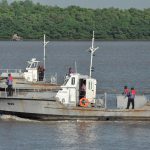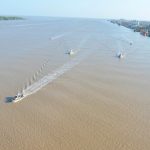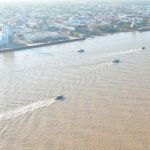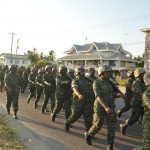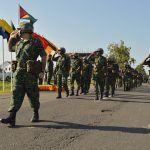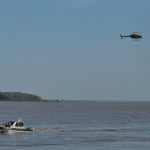Army Chief-of-Staff tells troops to … BE RESOLUTE – in defending and defining Guyana’s territory
CHIEF-of-Staff of the Guyana Defence Force (GDF), Brigadier Mark Phillips, has said the GDF will remain resolute in defending and defining Guyana’s territory.
Addressing hundreds of soldiers who marched from Better Hope, East Coast Demerara and from Providence, East Bank Demerara to Camp Ayanganna in the city, the Brigadier declared: “Today, nations arm themselves for peace, not for war.”
He said the presence of local soldiers at the Guyana–Venezuela border is necessary to define aggression and defend Guyana, and to ensure development in the long run.
“We are defending Guyana. We are defining aggression on our frontier, because we want to have peace in our country, so that we could develop our country and we can take our place as a great nation among the many nations of the world,” he declared.
The Brigadier noted that the GDF has been defending Guyana for the past 50 years.
Saturday’s march came just a few days after announcement by the Guyana Government of intensified military operations by Venezuela at the Guyana–Venezuela border, and the move by the Venezuelan military to have machine gun-mounted vessels patrolling Guyana’s Cuyuni River.
Brigadier Phillips said President David Granger’s message at the 70th United Nations General Assembly, being held in New York, is one of peace. He believes that the President’s message of peace, not war will yield success and the border controversy with Venezuela will be settled peacefully.
He told his troops: “I urge you to remain alert, to remain set and ready to defend Guyana…. Remain alert at the threats to development in Guyana. We don’t want war, we want peace.”
President Granger’s message, the Brigadier said, is one that springs hope of Guyana converting from a “poor country to a rich country.” He said that, with peace, “We can exploit, in a meaningful manner for the benefit of all Guyanese, the resources of Guyana. So the GDF remains resolute, responsible, committed to defending Guyana; to ensure a peaceful development of Guyana.”
The Chief-of-Staff added that he is optimistic the “outcome of President Granger’s discussions at the UN will lead to a peaceful settlement with our western neighbours. We don’t want war…we are defining aggression for peace.”
Venezuela re-asserted its claim to the Essequibo in May, following the disclosure by US oil giant ExxonMobil that considerable oil reserves have been discovered offshore Guyana. Venezuelan President Nicolas Maduro has held firm to claims that the Essequibo belongs to Venezuela. He recently stated via his weekly televised programme, ‘Contact with Maduro’, that he wishes to meet with President Granger at the UN General Assembly with the hope that the meeting can point to “steps to regularise relations between the Co-operative Republic of Guyana and the Bolivarian Republic of Venezuela.”
Maduro said he is prepared to undertake all diplomatic actions with the aim of resolving the border controversy. “We, via the Geneva Agreement and international law, maintain our historic claim: Guyana Essequibo we left [Simon] Bolivar,” he was quoted as saying.
Approximately 200 troops have been participating in what the Venezuelan Minister of Defence has called “operational exercises” along the Guyana-Venezuela border; but President Granger has described the heightened presence of marine troops and various forms of ground forces near the Guyana border as “abnormal” and “provocative”.
“We feel that Venezuela is treading a dangerous course at this point in time. Rather than seeking a peaceful resolution of the matter, Venezuela seems to be pursuing a very offensive and aggressive course,” Granger told reporters.
The military build-up by Venezuela also comes after that country suspended the accreditation for Guyana’s Ambassador to that country, Ms Cheryl Miles.
Presidents Granger and Maduro are likely to meet UN Secretary General Ban Ki-moon to decide on ways of bringing to an end this border controversy. Guyana, through its President, has said that it is interested only in a juridical solution to the age-old controversy.
Guyana’s contention is that the 1899 Arbitral Tribunal Award that settled the border with Venezuela is a full, final and perfect settlement.
By Ariana Gordon


